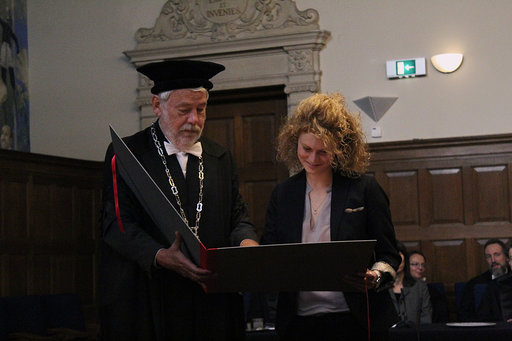Essays on Global Buisness Networks, Governance, and Institutions
Sarah Castaldi recently completed her PhD dissertation at the Department of Global Economics and Management at the University of Groningen. In her PhD thesis, Sarah investigated how external and internal governance structures affect the implementation of social sustainability practices in global textile/garment supply chains. This emerges from her ambition to understand how firms from different institutional settings can apply and manage diverging organizational practices between geographical locations.
Challenging data collection
Specifically, Sarah’s thesis circled around the question how can MNEs assure that their global textile supply chains are sustainable? She collected survey-data on the first-tier supplier in 11 different countries (Bangladesh, Brazil, China, India, Indonesia, Malaysia, Pakistan, Portugal, Romania, Turkey, and Vietnam) on their CSR implementation, and their relationship to their main buyer (i.e., MNE) located in Western Europe or North America. In Asia Pacific and South America, she cooperated with local industry/trade associations, which interviewed the suppliers on-site for her. Within Europe, she collected the data herself by attending fashion fairs where suppliers exhibited their production. Although, she essentially ended up with about 600 supplier-level observations, it took her more than one year. In most of the countries, trade/industry associations, and suppliers were only willing to commit once a relationship was established. Therefore, Sarah used the first months to talk on the phone or Skype, had email exchange, and became Facebook friends. Once she mobilized the trade/industry associations and they were committed to the project, they themselves had to establish a relationship with local suppliers ensure their participation in the project: “All in all, it took a very long time and often I was challenged with delays or technical problems. Sometimes emails would bounce back, or numbers were unavailable, even though I had just called or emailed the day before. Well, that is just what you get when doing business with emerging countries I guess”, Sarah explains about the challenging data collection process.
Inspired by the Rana Plaza building collapse
Sarah started her PhD just a few month after the Rana Plaza building collapsed in Bangladesh, which was the worst industrial incident to hit the garment industry ever: “It inspired me to conduct research on labor conditions in garment/textile supply chains. Researching labor conditions in garment/textile suppliers, especially after such an incident hit the industry, is of course very sensitive, thus I had to think strategically on how to mobilize people to help me”, Sarah tells about what inspired her to start working with the project.
After Sarah conducted her first interviews with practitioners in the field (e.g. NGOs, Western fashion retailers and their suppliers), she realixed that MNEs often imposed ‘Western standards’ on their suppliers, which are often conflicting with local conditions. This inspired her to collect data on the supplier-level because, as Sarah states herself: “We need to understand the challenges that the supplier faces to understand how we (as in MNEs) can help.”
Sarah is currently involved in a research project on local ‘supplier development’ initiatives in Ethiopia, and how these affect sustainability in global supply chains. You can read more about the research project here.
